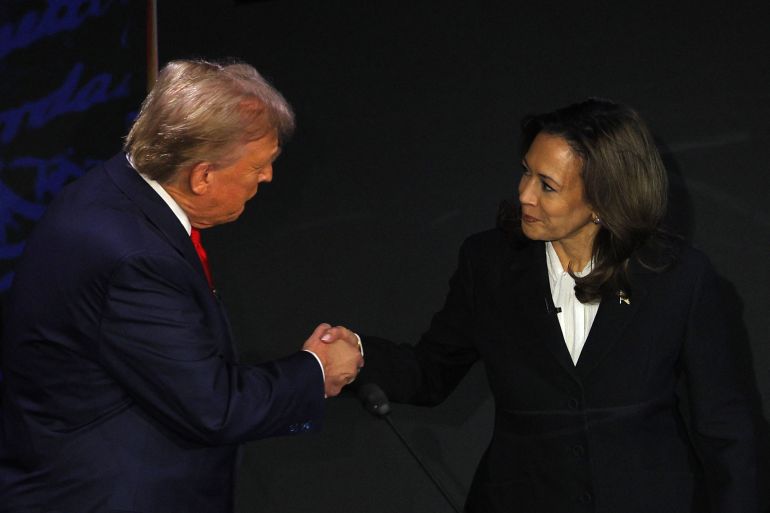Donald Trump, Kamala Harris locked in close election race: WSJ poll
Wall Street Journal study suggests Trump and Harris neck-to-neck in six key swig states before the November 5 vote.
Republican presidential nominee, Donald Trump and Democratic nominee, Vice President Kamala Harris shake hands at a presidential debate in Philadelphia, September 10, 2024 [Brian Snyder/Reuters]By Al Jazeera StaffPublished On 11 Oct 202411 Oct 2024
Democratic candidate Kamala Harris and her Republican rival Donald Trump are locked in a dead heat race for the presidency in the United States less than a month before the vote, a new Wall Street Journal poll suggests.
According to the data, published on Friday, the vice president and former president are within two percentage points of one another in six of the seven battleground states that will ultimately decide the next president.
In the poll, while Harris led in the states of Arizona, Georgia and Michigan, Trump was ahead in Pennsylvania, Wisconsin, North Carolina and Nevada. All the results are within the margin of error with the exception of Nevada, where Trump is led by 5 percent in the WSJ poll.
The newspaper said it surveyed 600 registered voters per state between September 28 and October 8.
US elections are not won by popular vote nationwide. Rather, candidates compete in individual states to win electoral college votes.
It’s akin to a point system, where each state is worth a number of points proportionate to the size of its population. In all but two states – Maine and Nebraska – the winner takes all the electoral college votes.
Most states are almost certain to go to one party. For example, a Democratic win in California and Vermont is often projected as soon as the polls close, while states like Oklahoma and Alabama are Republican strongholds.
The battleground states
That leaves a handful of states where there are close, competitive elections. These are known as swing states. In this round, all eyes are on the seven states polled by WSJ.
In 2016, Trump won the presidency despite losing the popular vote because he defeated the Democratic candidate Hillary Clinton in most battleground states.
According to a Pew Research Center survey released on Friday, Harris is leading the race nationally by one point – 48 percent to Trump’s 47 percent.
US election poll results have fluctuated in recent months. While Trump enjoyed a solid lead over Joe Biden earlier this year in almost all polls, the Democrats received a boost after the US president stepped aside and was replaced by Harris as the party’s nominee.
A Morning Consult poll in September had Harris beating Trump 51 percent to 46 percent. But the former president appeared to claw back some support amid concerns about the economy and the turmoil in the Middle East.
US election polls have also been wide off the mark in the past. For example, many surveys had indicated that Clinton was set for a comfortable win when she lost to Trump in 2016.
Still, this year various polls appear to agree that the US is heading to a close presidential election next month.
Senate race
Control of the Senate and House of Representatives will also be up for grabs on November 5.
A New York Times poll on Friday predicted bad news for Democrats’ hopes of protecting their narrow majority in the Senate.
The Democrats currently control the 100-member chamber with 51 seats, including four independents who caucus with the party.
But the Times survey found that Democrats are likely to lose a potentially decisive seat in a Republican-leaning state.
Republicans were already expected to flip a Senate seat in West Virginia – where conservative Democratic incumbent Joe Manchin is not running for re-election.
But the Times poll indicated Democratic Senator Jon Tester is trailing his Republican opponent by eight percentage points in rural Montana, where Trump won with ease in 2016 and 2020.
Democrats will also have a fight on their hands to keep Senate seats in Michigan, Pennsylvania, Ohio, Arizona and Nevada, but they will be hoping to challenge Republican incumbents in Texas and Florida.
A Republican-controlled Senate can prove to be a major hurdle for Harris should she win in November.
Beyond its legislative powers, the Senate is tasked with confirming judicial appointments and cabinet members, which would allow Republicans to pressure Harris, should she be elected, on who she chooses for her governing team.
